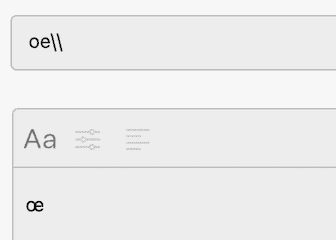Replacement in the middle of a word
Typinator deliberately does not expand abbreviations that start in the middle of a word, even when you select "Expand on match". The reason for this is that almost any combination of letters can occur in the middle of a word. It is therefore likely that you get unwanted replacements. For example, when you define "mp" as an abbreviation for "microprocessor", you certainly don't want it to turn "example" into "examicroprocessorle".
But there are situations where you actually might want to insert special characters in the middle of a word. For example, assume you need to write German names with an English keyboard that lacks umlaut keys. To create "abbreviations" that you can use for typing umlauts in the middle of a word, just start the abbreviations with special characters. For example, try the backslash character to translate "\a" into "ä" and "\U" into "Ü".
With Typinator 6.0 or newer, you can also use regular expressions for replacements inside words. In contrast to normal abbreviations, regular expressions are considered even when the matching text immediately follows other letters. This means that you can use arbitrary sequences of letters as abbreviations that should be replaced in the middle of words. But when you do this, you should carefully select combinations of letters and characters that are unique, so they do not trigger unwanted replacements, as in the “mp” example in the first paragraph to the left. One way to do this is to use special characters after letters.
For example, you could create a rule that translates “oe\\” into “œ” (as in Bœuf Stroganoff). But when you do this, you need to “escape” the backslash character, since it has a special meaning in regular expressions. Escaping is done by prefixing the backslash with another backslash, so the final replacement rule looks like this:
